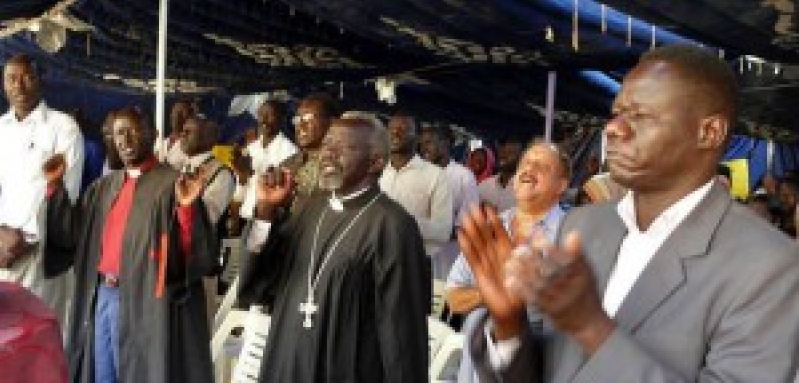
A court has ruled that committees the Sudanese government imposed on a North Khartoum church in order to enable Muslim investors to take it over were illegal, sources said. A victory in the Khartoum Bahri Evangelical Church's four-year battle to retain ownership of its property, the Aug. 31 ruling by the Administrative Court of Appeal ruled the Ministry of Guidance and Religious Endowments interfered with church matters, the sources said.
The church, which belongs to the Sudan Presbyterian Evangelical Church (SPEC), has been subject to arrests and demolition of its property as the congregation has objected to the attempted takeover. Two South Sudanese pastors were jailed since December 2014 and January respectively, charged with capital crimes, over their support for the congregation's fight to prevent the take-over by Muslim investors.
The Rev. Yat Michael, 49, and the Rev. Peter Yein Reith, 36, could have been sentenced to death or whipping had they been convicted of the serious charges concocted against them by Sudan's National Intelligence and Security Services (NISS). They were convicted of lesser charges on Aug. 5 and released on time served. They and their families have since relocated to a third country to protect them from Islamist retaliation.
Khartoum Bahri Evangelical Church and SPEC leaders said they consider the court ruling a step in the right direction toward ending all attempts to hand over their property to Muslim investors.
"Things are working well for us; thank God for all your prayers for the church," said SPEC Treasurer George Adam.
The Rev. Yahya Abdelrahim Nalu, a senior SPEC leader, described the ruling as a great victory for the church. Whether the government will try to appeal has remained unclear, though church leaders said the ruling was final.
The ruling nullifies three committees the Islamist government imposed on the church. The seven-page decision described the actions of the Ministry of Guidance and Religious Endowment as illegal and mere interference in SPEC affairs.
"The ministry has no right to interfere into the matters of SPEC," according to the ruling.
The court cited the fact that SPEC has its own constitution and leadership structure to govern its activities, and that no entity should interfere in its internal affairs.
Whether there would be reparations for demolitions that took place in the church compound based on government-secured court orders remained unclear. Riot police seized the property by force in February, and on Nov. 17-18, 2014, a bulldozer accompanied by security personnel and police knocked down a wall of the church and houses in the church compound. Christians formed a human barrier to face down further demolition attempts on Nov. 19-20, 2014.
One of the homes destroyed in the compound belonged to Nile Theological College; a Christian doctor had rented it, and he lost all his belongings, sources said.
The bulldozer, accompanied by NISS personnel and police, carried out the demolitions based on a court order demanding that church leaders surrender the premises to Muslim investors. The church committee of members that the Sudanese government interposed made a secret agreement with the investors to sell the church property as part of Sudan's campaign to do away with Christianity in the country, church leaders said.
Police in North Khartoum on Dec. 2 beat and arrested 38 Christians from the church and fined most of them. They were released later that night.
On Oct. 5, 2013, Sudan's police and security forces broke through the church fence, beat and arrested Christians in the compound and asserted parts of the property belonged to a Muslim investor accompanying them. As Muslims nearby shouted, "Allahu Akbar [God is greater]," plainclothes police and personnel from NISS broke onto the property aboard a truck and two Land Cruisers. After beating several Christians who were in the compound, they arrested some of them; they were all released later that day.
Harassment, arrests and persecution of Christians have intensified since the secession of South Sudan in July 2011, when President Omar al-Bashir vowed to adopt a stricter version of sharia (Islamic law) and recognize only Islamic culture and the Arabic language. The Sudanese Minister of Guidance and Endowments announced in April 2013 that no new licenses would be granted for building new churches in Sudan, citing a decrease in the South Sudanese population.
Sudan since 2012 has expelled foreign Christians and bulldozed church buildings on the pretext that they belonged to South Sudanese. Besides raiding Christian bookstores and arresting Christians, authorities threatened to kill South Sudanese Christians who do not leave or cooperate with them in their effort to find other Christians (see Morning Star News).
Sudan fought a civil war with the south Sudanese from 1983 to 2005, and in June 2011, shortly before the secession of South Sudan the following month, the government began fighting a rebel group in the Nuba Mountains that has its roots in South Sudan.
Due to its treatment of Christians and other human rights violations, Sudan has been designated a Country of Particular Concern by the U.S. State Department since 1999, and the U.S. Commission on International Religious Freedom recommended the country remain on the list in its 2015 report.
Sudan ranked sixth on Christian support organization Open Doors' 2015 World Watch List of 50 countries where Christians face most persecution, moving up from 11th place the previous year.







